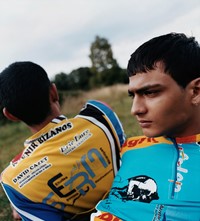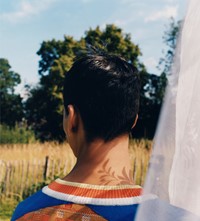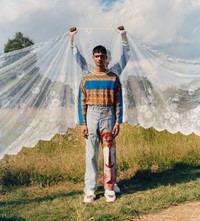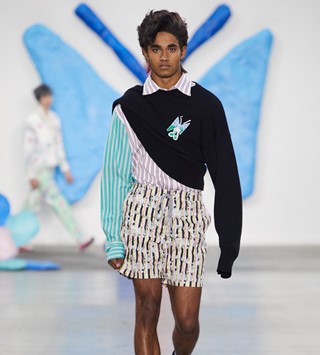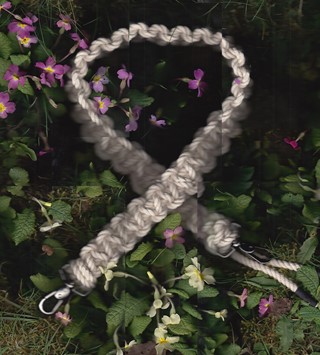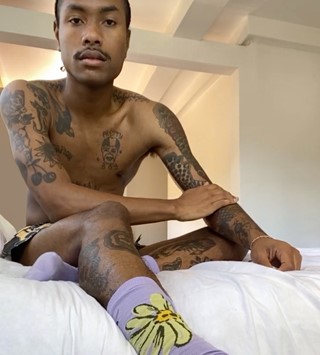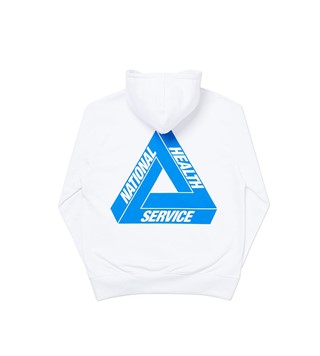Priya Ahluwalia’s eponymous label transforms deadstock and vintage clothing into collections inspired by her heritage and upbringing – from Indian tailoring to 1990s garage raves
- TextJack Moss
- Who is it? Ahluwalia is the eponymous label of London-based designer Priya Ahluwalia
- Why do I want it? Sustainably minded collections made from vintage and deadstock clothing, inspired by the designer’s Nigerian-Indian heritage and growing up in London in the 1990s
- Where can I find it? Ahluwalia’s collaboration with Matches Fashion is available now, while the label’s Spring/Summer 2020 collection is available from numerous stockists you can find on Ahluwalia’s website
Who is it? It was on a trip to visit her father in Lagos, Nigeria, back in 2017 that London-based designer Priya Ahluwalia noticed that the “hawkers” – the street sellers in who make their trade in the city by approaching cars caught in traffic jams – were wearing obscure items of British clothing (one, she remembers, was wearing a London Marathon T-shirt from 2012). “I’m quite an inquisitive person so I just started winding down the windows and asking people where they got their clothes from,” says Ahluwalia, who was then studying on the Menswear MA course at London’s Westminster University.
The answer, she found, after numerous conversations and a late night spent researching on the internet, was a second-hand clothing market in the city – the stock of which came mostly from unwanted donations to British charity shops, then sold on by the various traders for profit. She was immediately fascinated by the journey of these garments, and had what she calls a “hunch” that there was much more to be discovered about the vast amount of clothing which is discarded by Western countries each year – a hunch that would eventually lead her to Paniptat, India, known as the global capital of clothing “recycling” (most garments cannot be recycled, and are instead passed onto traders to be sold on).
Overcome by the colossal amount of waste clothing she found in the city’s recyling plants – often stacked into mountainous piles, sorted by colour – and unsure whether she could communicate the sheer scale of the problem via her own MA collection, she instead began to document what she saw in a series of photographs. The outcome was Sweet Lassi, a book that combined these photographs with imagery of her eventual MA collection – itself made from repurposed vintage and deadstock fabrics – and featured contributions from industry figures like Sarah Mower MBE and Ben Reardon, published as a wake-up call to the industry about the shocking excess of clothing which is being produced around the world.
After graduation, Ahluwalia founded her namesake label, Ahluwalia – though it wasn’t necessarily always part of the plan. “To be honest, I wasn’t sure exactly what I was going to do when I graduated, I think I was just thinking about the finish line of the degree,” she says. But the reception to both the collection and book – itself credited with bringing the second-hand garment industry onto fashion’s agenda – saw her graduate collection purchased by British retailer LN-CC (in the time since she has added a slew of other retailers, including Browns and Matches Fashion). Helming her own label fulfills a desire to be a designer that Ahluwalia has harboured since childhood: “ever since I was a kid I knew I wanted to design clothes,” she says, crediting much of this to her mother’s wardrobe. “My mum was always very stylish and I remember trying on her clothes constantly.”
In fact, Ahluwalia’s family background – the designer was born to a Nigerian father an Indian mother – is where she finds much of her inspiration. “I have always loved looking through old family photos and analysing what everyone wore; I’m quite nostalgic and sentimental,” she says. Her Spring/Summer 2020 collection imagined what her family might have worn to garage raves when she was still a child, while other pieces have taken their inspiration from tailoring her Punjabi grandfather made and wore in the 1960s. It gives her colourful collections an undeniable energy – one which has carried her all the way to the final of this year’s LVMH Prize, where due to the coronavirus outbreak, the prize was split between the eight finalists (including fellow London-based designers Supriya Lele, Nicholas Daley and Chopova Lowena).

Why do I want it? Launched last month, Ahluwalia’s latest collection is a collaboration with Matches Fashion, an expansion of the Spring/Summer 2020 collection she showed last June. “I thought about the Matches customer, how they are quite sophisticated as well as fun, which inspired my choice of colours – burnt orange, oatmeal, and browns,” she explains. Consisting of 11 new pieces, she began with the idea of clothing being passed down through a family – including her own, who appear on the collection in a collage of prints, from baby pictures to passport portraits. Each of the pieces – including patchworked tracksuits, panelled denim and a safari-style jacket – were made from vintage, recycled or organic fabrics. It means that, besides just being sustainably minded, they are often one of a kind – something Ahluwalia hopes means people will keep them forever.
As for sustainability within the industry, Ahluwalia has no desire to preach to either consumers or her fellow designers – though she does hope that change is coming in the way that people think about incorporating it into their practices. “Designing is essentially problem solving, and adding the issue of reducing negative impacts of production into your problems to solve can actually be really interesting as well as good for the planet,” she says. For now, in the wake of coronavirus, she is most concerned about the garment workers who produce clothing in developing countries, particularly for western fast-fashion labels. “Globally, workers’ rights need to be improved, I have been heartbroken to see how little support garment workers in other countries have had during this pandemic.”
Closer to home, the outbreak saw the delay in release of Ahluwalia’s new book Jalebi – which was due to launch with a party alongside Matches Fashion – though Ahluwalia is continuing to work, despite being apart from her team. “I’m trying to navigate how to move the business forward but it is difficult at the moment as there is so much uncertainty,” she says. Like other designers, though, she is hoping to use the unique circumstances of lockdown as a spark for creativity: “I know it is out of my hands for now so I am trying to focus on fun things I can do like research and concepts. I am using the time I would usually be spending on production or admin to watch more documentaries, listen to music and go through all my books – normally, only about 20 per cent of my time would be able to be spent on research and design as there are so many elements of the business, so I am using the extra time I have right now for creativity.”
Where can I find it? Ahluwalia’s collaboration with Matches Fashion is available now, while the label’s Spring/Summer 2020 collection is available from numerous stockists you can find on Ahluwalia’s website.
